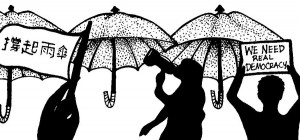Hong Kong student protesters should retreat from the streets
Today marks one month since the pro-democracy protests erupted on the crowded streets of Hong Kong. Though Sunday’s cancellation of a referendum for protesters underscores the caution put into each step going forward, it also draws attention to cracks of division forming within the pro-democracy forces.
Without a clear leader, the movement has a spontaneous, grassroots nature that has served as its strength so far, with crowds of young people organizing themselves. That amorphous aspect, however, could also become its biggest weakness as chaos escalates. Instead of continuing to hold out in the streets, protesters should retreat before the movement loses credibility amid the din of violence.
Make no mistake: Retreat would not detract from the fact that the movement has been one of remarkable power and value. Lauded as one of the most peaceful protests in the world, the insurgence reflects that student protesters understand the need to heed the expectations of good citizenship to succeed.
Yet, as police brutality intensifies in these later days, the movement could lose credibility and unity by continuing. The heavy smog of mistrust has pervaded the city, and displays of violence make what started out as a peaceful protest seem radical and out of control. Videos online have surfaced, showing police dragging protesters into alleyways and proceeding to beat them. On Oct. 18 in the neighborhood of Mong Kok, according to The Guardian, 20 people were injured in clashes with police, who were wielding heavy batons, metal guardrails and pepper spray. In the densely packed district far poorer than the commercial streets of Admiralty and Causeway Bay, police brutality and the presence of anti-Occupy Central protesters, coupled with the differing aims of pro-democracy groups, exacerbated the chaos.
The divisions cut into the family room as well. Differing views on the protests have strained relations in many households. The Sydney Morning Herald interviewed a citizen identified as Mr. Mak, and his 18-year-old son Dasher, who has been attending rallies. Worrying for his son’s safety, Mr. Mak said, “I don’t have any opinion; the chief executive has nothing to do with me. I just think about making enough money, paying for our food and bills, and just try to live comfortably.” Many adults don’t see a point in upsetting a status quo that provides relative stability. As of 2014, 76.4 percent of the population are aged 25 and above, according to CIA World Factbook. Without the older generation on board, it’s difficult for the movement to really say it speaks for all of Hong Kong’s citizens.
Granted, the government’s unyielding stance — even in the face of such passionate cries for change — is unacceptable. But to carry on even as tensions rise could be an even larger risk for the movement as a whole.
Add to that the divisions and disorganization demonstrated by the vote cancellation, and retreating seems like the best option right now. By no means does that translate to a surrender though.
Thirty-three years remain before Hong Kong will revert to full Chinese governance. It is the youth, not the older generation, who will inherit this new political reality. Democracy won’t happen overnight, and students can’t stay out on the streets forever, but the hope to fight for their freedom and ideals is very much alive.
Regardless of the endgame, Beijing cannot continue to ignore the pro-democracy protests that have politically reawakened Hong Kong to the ongoing struggle of democracy so integral to the future of its people.
Valerie Yu is a junior majoring in English. She is also the editorial director of the Daily Trojan. “Point/Counterpoint” runs Tuesdays.


